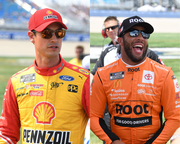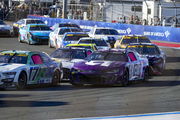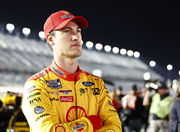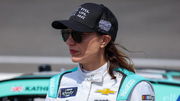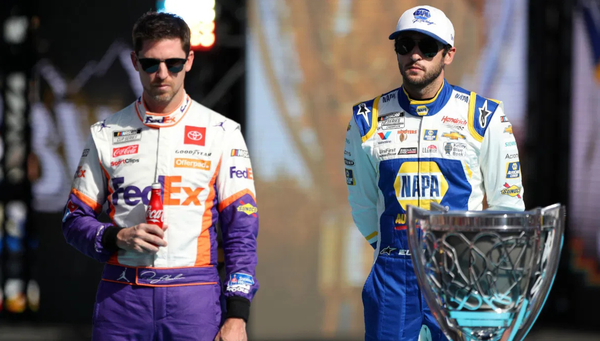

For years, NASCAR thrived on the backs of charismatic superstars who transcended the sport. Jeff Gordon, Dale Earnhardt, Dale Earnhardt Jr., Richard Petty, and more. These weren’t just race car drivers; they were icons, regularly featured in mainstream media, from Hollywood films to television skits. Yet, in recent years, the sport has struggled to maintain that level of cultural relevance even with Chase Elliott.
As the legends retired, NASCAR found itself in a void, desperately seeking new faces that could capture viewers the way Gordon and Earnhardt Jr. once did. While Chase Elliott and Denny Hamlin are two of the sport’s biggest names today, veteran Kenny Wallace believes NASCAR is still lacking in personalities that draw widespread attention.
ADVERTISEMENT
Article continues below this ad
Kenny Wallace describes two different types of fame
On The Kenny Wallace Show, Wallace has earned his status as a controversial veteran due to his outspoken nature, unfiltered opinions, and willingness to challenge NASCAR’s status quo. Throughout his career as a driver and analyst, he has never shied away from speaking his mind. This time, the driver-turned-analyst voiced his concern over NASCAR’s star power. “The fans that we have, they are Dale Earnhardt Sr. fans and they are Bill Elliott fans,” Wallace stated. He later made a striking assertion, “Sadly, Chase Elliott is our last big hope.”
Chase Elliott, the son of NASCAR legend Bill Elliott, carries the weight of being the sport’s most popular driver for 7 consecutive years. He represents a parallel to the past, a throwback to the days when family legacies carried weight in stock car racing. But Wallace’s comments suggest that beyond Elliott, there’s only so much star power left to draw in new generations of fans.
However, Wallace pointed out that Denny Hamlin has carved out his own role, one which is not as a beloved fan favorite, but as a necessary antagonist. “The only one we got is Denny Hamlin because he pi—es everybody off so much that they come back– ‘Oh I’m gonna answer you’. He’s like an old Darell Waltrip. Denny runs that mouth but then he shows up and leads the race and runs third. That’s competition.” Hamlin’s brash personality and willingness to embrace the villain role have made him one of the most talked about and polarizing figures in the sport, proving that even controversy keeps fans engaged.
Wallace’s assessment of Hamlin as a ‘loudmouth’ is well-founded. One of his most infamous moments came in 2023 at Phoenix when he admitted on his podcast, Actions Detrimental, that he intentionally wrecked Ross Chastain to send a message. That admission earned him a fine and penalty from NASCAR, reinforcing his status as the sport’s top villain. Another instance was his heated feud with Kyle Larson in 2023 when contact between the two led to Larson calling Hamlin a hypocrite for not owning up to his aggressive moves.
Trending
ADVERTISEMENT
Article continues below this ad
NASCAR’s lost pop culture influence: A stark contrast to Elliot’s pull
Wallace’s comments reflect a deeper issue – NASCAR’s fading presence in pop culture. There was a time when the sport was a staple in American entertainment. Jeff Gordon hosted Saturday Night Live, Dale Earnhardt was a household name across generations, and Dale Earnhardt Jr. carried the torch as a beloved mainstream figure in many commercials. Hollywood embraced NASCAR, with Days of Thunder bringing the sport to the big screen, and Cars introducing a new generation to the world of stock car racing. Celebrities used to flock to the Daytona 500, cementing its status as a marquee event.
Fast forward to today, and that same cultural crossover is noticeably absent. Perhaps the most telling moment came when Kyle Larson’s visit to Disneyland after his 2021 NASCAR Cup Series championship win highlighted NASCAR’s fading mainstream recognition. Despite a historic 10-win season, Larson found himself largely unrecognized, joking that he had hoped for “more pandemonium” to access celebrity perks. His experience underscores NASCAR’s struggle to maintain cultural relevance. Despite NASCAR President Steve Phelps’ optimism about rising ratings, Larson’s anonymity suggests the sport may be in its own bubble, raising questions about its true connection with a broader audience beyond its dedicated fanbase.
While Wallace believes Elliott is the last hope for superstardom, and Hamlin keeps the conversation alive with his antics, NASCAR still faces an uphill battle in reclaiming its cultural stronghold. Without a new wave of drivers who can captivate audiences on and off the track, the sport risks losing the mainstream appeal it once commanded.
ADVERTISEMENT
Article continues below this ad
For now, the torch rests with Elliott and Hamlin, two vastly different figures in modern NASCAR. Whether they can bring back the sport’s former glory, remains an open question. Who do you think holds the potential to get to their status? Let us know in the comments.
ADVERTISEMENT
ADVERTISEMENT
ADVERTISEMENT
ADVERTISEMENT


